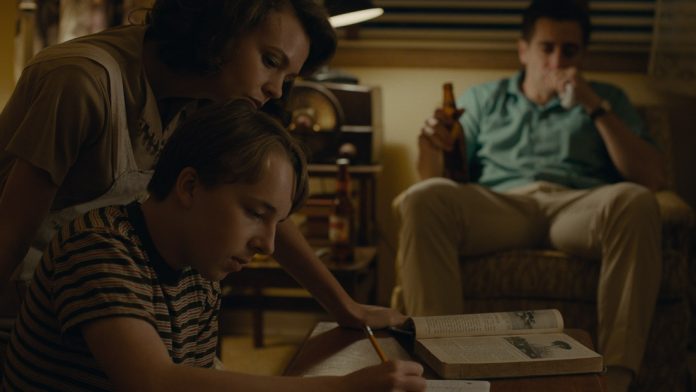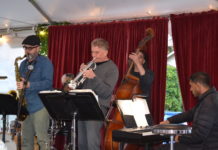“Wildlife,” Paul Dano’s promising directorial debut, compellingly anatomizes the disintegration of a marriage through the eyes of the couple’s young son. Adapted by Dano and Zoe Kazan from Richard Ford’s 1990 novel of the same name, the film grapples with familial crisis and its conflicting emotions, but in an understated, delicately perceptive way which brings fresh insight to this familiar subject matter.
The film begins with a mid-century tableau of domestic harmony, as Jerry Brinson (Jake Gyllenhaal) and his 14-year-old son Joe (Ed Oxenbould) toss a football back and forth on the front lawn of their modest house in Great Falls, Montana. As the family sits down to dinner prepared by Jeanette (Carey Mulligan), the mother of the house, everybody seems safely bracketed within prescribed familial roles circa 1960—Jeanette, primly maternal, Jerry an attentive father, looking forward to his son’s football tryouts.
But all is not as it seems. The Brinson family is struggling financially. Jerry, ever restless and unfulfilled in his job as a pro-golf-instructor, has recently relocated his family, and not for the first time. Gyllenhaal—who always brings much psychological complexity to this sort of role—convincingly undermines Jerry’s extrovert charisma and confidence with every facial expression and bodily gesture, revealing deep undercurrents of self-doubt. Mulligan projects the weary stoicism of a woman who, though disappointed in her marriage, is not ready to give up on it.
Nothing seems insurmountable, but there’s a hint of menace in the air—and smoke—as seasonal fires burn out of control in the mountains surrounding the town. When Jerry is fired from his job at the local golf club, the slight to his dignity sends him into a tailspin and precipitates familial crisis. Seizing impulsively upon the idea of joining the fire crews—staffed mainly by low-wage transients—Jerry heads for the hills to take on the conflagration, while Jeanette, outraged, inconsolable, then pragmatic, by turns, takes a job as a swim teacher.
With her marriage, in her eyes, dissolved, Jeanette tries on for size long-suppressed former identities, or contemplates new ones. Joe encounters her wearing an unfamiliar bright magenta top, reminiscing girlishly about her days as a youthful rodeo beauty. “It’s probably nice to know your parents were once not your parents,” she says, but Joe’s bewilderment—superbly conveyed through Oxenbould’s boyish innocence and plaintive eyes—tells a different story. Lines are crossed, rules broken, and as Jeanette embarks upon an affair with an older, prosperous car dealer (the excellent Bill Camp) she’s met at the pool, she furnishes her son with a front row seat on the spectacle of her infidelity.
It’s not hard to see why Mulligan has generated so much Oscar buzz in this role. With its sudden shifts in character and emotional extremes, the part demands a lot from her, and Mulligan successfully delivers, mining every nuance to powerful effect. Oxenbould, by contrast, expressing Joe’s voiceless confusion, provides drama of a different sort, no less powerful it its way. Dano, embracing its inherent understatement, intelligently opts to keeps his focus squarely on Joe’s mute agony, his camera quietly observing a floundering Joe, as he tries to make sense of his parents’ disintegrating marriage and his mother’s erratic behavior.
Another director might have chosen to follow Jerry to the mountains to play out an archetypal struggle against the fire’s elemental force, Jerry redeeming his wounded masculinity, then returning to reunite his family. But, in Dano’s hands, Jerry’s impulsive flight seems more irresponsible and adolescent than courageous, a form of abandonment, achieving nothing. “What kind of man,” as Jeanette asks, “leaves his wife and child in such a lonely place?”
In a typical coming-of-age movie, we would expect Joe’s character to confront his mother, overcome obstacles, and emerge a stronger person for it—a trial by fire. From “Rebel Without a Cause” to “This Boy’s Life,” films of this sort have portrayed familial rupture as a crucible for self-transformation and growth. Dano departs from this tired formula, eschewing conventionally heroic plot lines, and emphasizing instead Joe’s paralysis, his inability to act, or even articulate, his thoughts and feelings as his world goes up in flames.
The symbolic fire in “Wildlife” is not a cleansing agent enabling positive regrowth, but a volatile, ungovernable force that threatens to engulf the fragile, transient world so sublimely and unsentimentally captured by Diego García’s expansive, objective cinematography. Lurking in the background, of course, is the social turmoil we know will soon sweep over the country. As President Kennedy’s voice crackles over Jerry’s car radio confidently proclaiming that his administration will usher in an era of stability and prosperity, Dano reminds us that the old certainties can evaporate overnight, that what is here today may be gone tomorrow.















.png)











